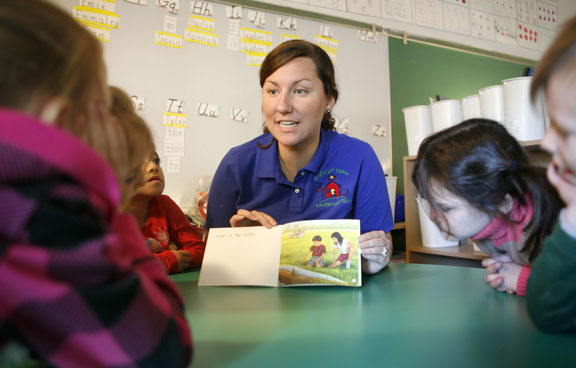
Kindergarten teacher Crystal Field reads to a small group at Kathryn Winn Elementary School (Carroll County) Nov. 1, 2010. Photo by Amy Wallot
By Susan Riddell
To improve student literacy, several Kentucky public school districts are changing current practices by engaging in comprehensive literacy planning.
This move comes on the heels of Senate Bill 163, passed during the Kentucky General Assembly’s 2010 regular session, which says that reading proficiency is “a gateway skill for all Kentucky students to achieve the academic goals established in KRS 158.6451. It is Kentucky’s goal that all children learn to read well before exiting the primary program and that all middle and high school students have the skills necessary to read complex materials in specific core subjects and comprehend and constructively apply the information.”
Administrators in Gallatin, Bullitt, Oldham, Franklin, Shelby, Carroll and Henry counties – plus several in the western part of the state – have been participating in professional development that concentrates on literacy focus and planning, and they are taking what they are learning back to their schools for discussion and potential implementation.
You have to “look deeply at current practice,” Pam Williams advises. Williams, who has been the elementary instructional supervisor for the Carroll County school district for three years, has played a big part in helping her district overhaul its literacy focus.
Comprehensive literacy planning in Carroll County hasn’t been a one-step, quick fix, she said.
“Our district used the Literacy PERKS (Program Effectiveness Review for Kentucky Schools) document to look at our total program in terms of curriculum, instruction, assessment, collaboration, environment, barriers to learning and teacher training to face the brutal facts as to the current reality of our literacy program in both elementary schools,” Williams said.
Surrounding-area literacy coaches, University of Louisville instructors and the Center for Adolescent Literacy were used in the review process for expert understanding of the literacy components and instructional best practices, Williams said. They guided discussion, monitored classrooms to look at the environment and analyzed documentation of lesson plans, assessment plans, interventions, student work and provided expert assistance.
Williams added that staff organized a document box with analysis during the literacy review on student work, lesson plans, daily routines, assessments, writing folders, curriculum maps and assessment data.
Literacy experts scored the program in Carroll County and met with district principals to offer insight and suggestions for change.
“We adopted a program with a defined literacy framework,” Williams said. “It was deemed necessary by a collaborative group of teachers and administrators, which addressed several concerns from the literacy review.”
Comprehensive literacy planning reaches out to all levels of education.
Henry County High School Principal Jim Masters attended professional development that gave him insight into revamping literacy at his school. He said the comprehensive literacy planning should hinge on “identifying the skills and concepts students should master regarding literacy then developing a plan to instruct, assess and re-teach/extend those skills and content.
“The overall long-term goal is to ensure all students reach proficiency in literacy, and that will be accomplished within a school-wide focus on the skills and content they must master.”
Masters’ training on the literacy planning took place at the Center for Collaborative Teaching and Learning.
“I learned how to assess our current literacy program within all our classes and how to focus on specific skills and content,” he said.”It has led the school into making changes. For example, we are ensuring that informational reading using three to four effective reading strategies are being consistently utilized in all classes, not just English. We are also implementing an enrichment period two times per week to address the learning needs of students regarding literacy standards they must master.”
“(Teachers are) being more strategic with reading, such as providing specific criteria to look for, and they are using the correct strategies to ensure learning is taking place. That will develop required skills and knowledge. Teachers also are modeling those strategies so that students get a visual of what they should be able to do,” Masters added.
According to Williams, Carroll County formed a district literacy committee that adopted a sequential focus for each grade level that included literacy components (speaking, listening, reading, writing and problem solving) and the key pieces of reading (phonics, phonemic awareness, comprehension and vocabulary).
The committee also developed an assessment plan, and each school has a specific connected focus for the year based on a written document to define expectations.
“We are focusing on thinking skills to make learning stick,” Williams said.
While these are just some of the changes the Carroll County district has made, impact on teachers has been just as profound, according to Williams.
“Through a program improvement effort, we believe we have provided the right professional development to focus staff on an improved level of content, improved teacher knowledge and skills, and an improved instructional core,” she said. “We have invested time to create literacy- focused classroom environments that include resource materials, a better text-leveling system and an improved system of interventions.
“Our teachers are demonstrating higher levels of understanding and learning, and students are producing higher-level work,” Williams added. “Teachers are more aware of student ability, which is based on a better designed assessment plan. Our staff has invested time and effort improving their knowledge base and developing a connected core program to ensure all students have access to best practices focused on all of them developing proficiency on grade-level literacy learning.”
MORE INFO …
Pam Williams, pam.williams@carroll.kyschools.us, (502) 732-7070
Jim Masters, jim.masters@henry.kyschools.us, (502) 845-8670







Leave A Comment